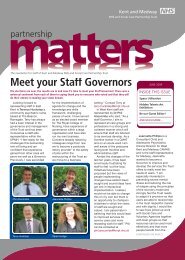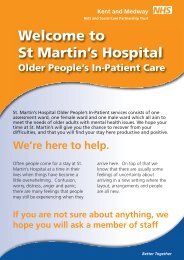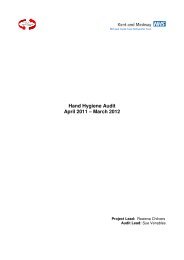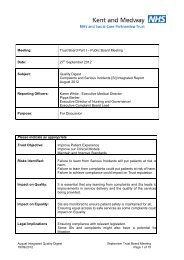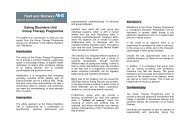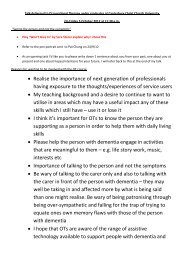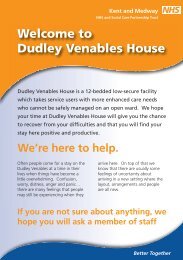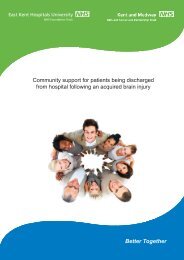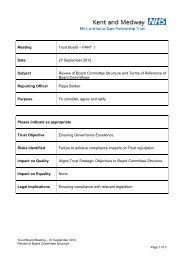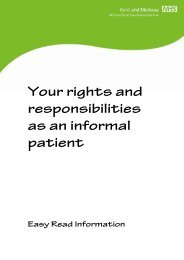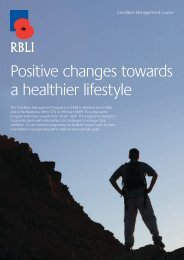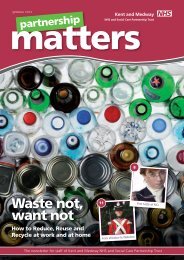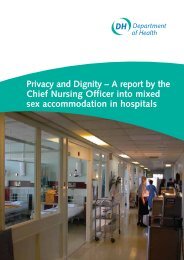Foundation Focus - January 2009 Edition - Kent and Medway NHS ...
Foundation Focus - January 2009 Edition - Kent and Medway NHS ...
Foundation Focus - January 2009 Edition - Kent and Medway NHS ...
You also want an ePaper? Increase the reach of your titles
YUMPU automatically turns print PDFs into web optimized ePapers that Google loves.
WORKING AT THE TRUST<br />
<strong>Kent</strong> <strong>and</strong> <strong>Medway</strong><br />
<strong>NHS</strong> <strong>and</strong> Social Care Partnership Trust<br />
My job at the Trust<br />
Iain Spink, Music Therapist<br />
Music, wrote William Shakespeare, is the food of<br />
love. According to KMPT, it can also be an excellent<br />
source of therapy for people suffering with<br />
dementia <strong>and</strong> a whole range of other mental<br />
health problems. That’s why the Trust has recently<br />
employed three music therapists to work across the<br />
region. We spoke to one of them, Iain Spink, <strong>and</strong><br />
asked him to explain a little more about his role.<br />
I studied for a music degree at<br />
Christchurch University in<br />
Canterbury before training for<br />
two years to become a music<br />
therapist at Anglia Ruskin<br />
University in Cambridge. Since<br />
the early 90s it has been<br />
compulsory for all music<br />
therapists to be stateregistered<br />
<strong>and</strong> there are<br />
currently about 600<br />
professionals working within<br />
the UK.<br />
Music therapists mainly work<br />
in psychological settings,<br />
although not necessarily<br />
mental health; other areas<br />
include acute hospitals (with<br />
stroke <strong>and</strong> brain-injury<br />
patients), special needs<br />
schools, nursing homes, care<br />
facilities <strong>and</strong> hospices. The<br />
Trust’s therapists are working<br />
primarily with Older Adults<br />
within acute wards, mostly<br />
with people suffering with<br />
dementia. Many therapists<br />
tend to specialise in one area<br />
<strong>and</strong> I particularly chose to work<br />
with older people after a<br />
placement in an OA ward<br />
while a student.<br />
It opened my eyes to how<br />
responsive older people are to<br />
music. Music can often reach<br />
people when nothing else can<br />
<strong>and</strong> is an excellent form of<br />
communication for people<br />
who have been cognitively<br />
impaired. Some patients have<br />
difficulty relating with others<br />
verbally but may interact with<br />
instruments or by singing.<br />
Several studies suggest that<br />
musical ability <strong>and</strong> appreciation<br />
often remain intact after<br />
others, including language,<br />
have diminished. For example,<br />
a person experiencing aphasia<br />
<strong>and</strong> memory loss may continue<br />
to recall <strong>and</strong> sing old songs<br />
from their childhood.<br />
Clients often have strong<br />
recall for song lyrics <strong>and</strong><br />
melodies <strong>and</strong> we can then<br />
work with those responses not<br />
just to create music but as an<br />
outlet for emotions that<br />
otherwise might not be<br />
expressed.<br />
In the therapy sessions,<br />
interactive music is<br />
spontaneously created using a<br />
range of instruments most<br />
appropriate to the clients’<br />
needs. By establishing a<br />
relationship through music,<br />
clients can experience <strong>and</strong><br />
explore new ways of relating,<br />
leading to development <strong>and</strong><br />
change. We also aim to help<br />
the client develop an increased<br />
sense of awareness, <strong>and</strong><br />
thereby to enhance his or her<br />
quality of life through creative<br />
self-expression.<br />
We use a variety of<br />
instruments that are accessible<br />
to non-musicians – drums,<br />
shakers, xylophone etc – <strong>and</strong><br />
the emphasis is on interacting<br />
with them <strong>and</strong> giving them the<br />
opportunity to use these<br />
instruments with other people.<br />
Patients who won’t talk will<br />
often engage with an<br />
instrument; I don’t mean just<br />
r<strong>and</strong>om hitting or shaking but<br />
really engage with it musically<br />
– rhythmically, melodically <strong>and</strong><br />
through their own body<br />
language.<br />
It sounds a lot of fun, but it<br />
has to be remembered that this<br />
is a form of psychotherapy <strong>and</strong><br />
what the patients are<br />
expressing might not have<br />
anything to do with enjoyment<br />
– they might be expressing<br />
frustration, or anger, or some<br />
other strong emotion. Music<br />
isn’t always associated with<br />
happy experiences <strong>and</strong> it may<br />
conjure up memories of loved<br />
ones who have died or all sorts<br />
of emotional experiences <strong>and</strong><br />
frustrations, but it is still useful<br />
in helping to create discussion<br />
within a group. Music is a very<br />
social activity; older people can<br />
often be socially isolated so<br />
this provides an opportunity<br />
for them to interact creatively<br />
with others. Our ultimate aims<br />
are always therapeutic, not<br />
necessarily musical.<br />
Iain Spink with Activities Organisers<br />
Darren Johnson <strong>and</strong> Pauline Gemmell.<br />
<strong>Foundation</strong> <strong>Focus</strong> <strong>January</strong> <strong>2009</strong><br />
13




